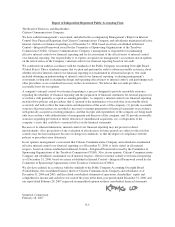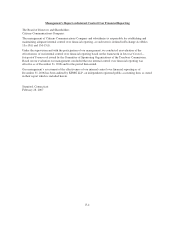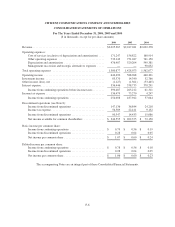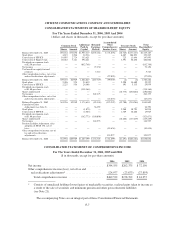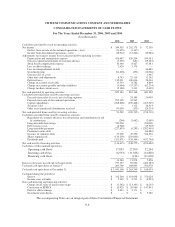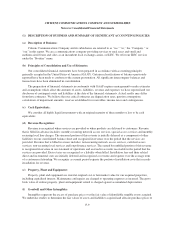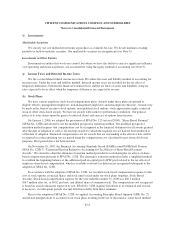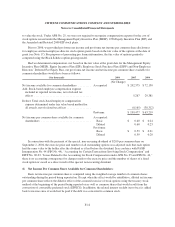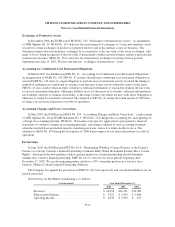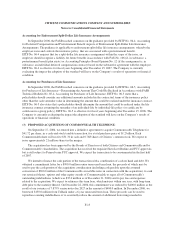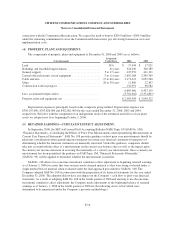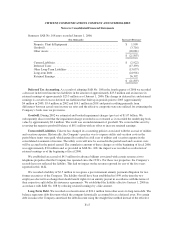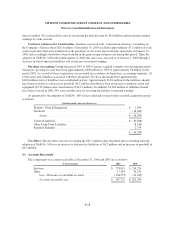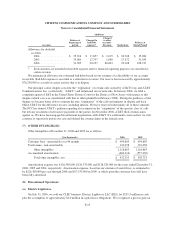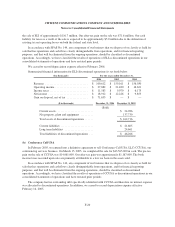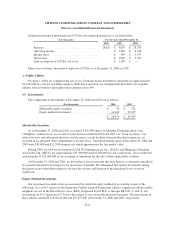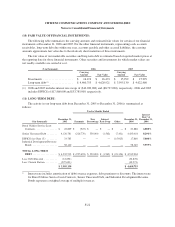Frontier Communications 2006 Annual Report Download - page 61
Download and view the complete annual report
Please find page 61 of the 2006 Frontier Communications annual report below. You can navigate through the pages in the report by either clicking on the pages listed below, or by using the keyword search tool below to find specific information within the annual report.CITIZENS COMMUNICATIONS COMPANY AND SUBSIDIARIES
Notes to Consolidated Financial Statements
(2) RECENT ACCOUNTING LITERATURE AND CHANGES IN ACCOUNTING PRINCIPLES:
Accounting for Defined Benefit Pension and Other Postretirement Plans
In October 2006, the FASB issued SFAS No. 158, “Employers’ Accounting for Defined Benefit Pension
and Other Postretirement Plans” (OPEB), which completes the first phase of a FASB project that will
comprehensively reconsider accounting for pensions and other postretirement benefit plans and amends the
following FASB Statements:
• SFAS No. 87, “Employers’ Accounting for Pensions;”
• SFAS No. 88, “Employers’ Accounting for Settlements and Curtailments of Defined Benefit Pension
Plans and for Termination Benefits;”
• SFAS No. 106, “Employers’ Accounting for Postretirement Benefits Other Than Pensions;” and
• SFAS No. 132(R), “Employers’ Disclosures about Pensions and Other Postretirement Benefits.”
SFAS No. 158 requires (1) recognition of the funded status of a benefit plan in the balance sheet,
(2) recognition in other comprehensive income of gains or losses and prior service costs or credits arising during the
period but which are not included as components of periodic benefit cost, (3) measurement of defined benefit plan
assets and obligations as of the balance sheet date, and (4) disclosure of additional information about the effects on
periodic benefit cost for the following fiscal year arising from delayed recognition in the current period.
For public companies, the requirements to recognize the funded status of a plan and to comply with the
disclosure provisions of SFAS No. 158 are effective as of the end of the fiscal year that ends after December 15,
2006. The requirement to measure plan assets and benefit obligations as of the balance sheet date is effective for
fiscal years ending after December 15, 2008. See Note 24.
Consideration of Prior Years’ Errors in Quantifying Current Year Misstatements
In September 2006, the SEC issued Staff Accounting Bulletin (SAB) No. 108, “Consideration of Prior
Years’ Errors in Quantifying Current Year Misstatements.” SAB No. 108 provides guidance concerning the
process to be applied in considering the impact of prior years’ errors in quantifying misstatements in the current
year. SAB No. 108 is effective for periods ending after November 15, 2006. The Company adopted SAB No. 108
in the fourth quarter of 2006. See Note 5.
Accounting for Uncertainty in Income Taxes
In July 2006, the FASB issued FASB Interpretation No. (FIN) 48, “Accounting for Uncertainty in Income
Taxes.” Among other things, FIN No. 48 requires applying a “more likely than not” threshold to the recognition
and derecognition of uncertain tax positions. FIN No. 48 is effective for fiscal years beginning after
December 15, 2006. We do not expect the adoption of FIN No. 48 to have a material impact on our financial
position, results of operations or cash flows.
How Taxes Collected from Customers and Remitted to Governmental Authorities should be presented in
the Income Statement
In June 2006, the FASB issued EITF Issue No. 06-3, “How Taxes Collected from Customers and Remitted
to Governmental Authorities Should be Presented in the Income Statement” (EITF No. 06-3), which requires
disclosure of the accounting policy for any tax assessed by a governmental authority that is directly imposed on a
revenue-producing transaction, that is Gross versus Net presentation. EITF No. 06-3 is effective for periods
beginning after December 15, 2006. We will adopt the disclosure requirements of EITF No. 06-3 commencing
January 1, 2007.
F-13


